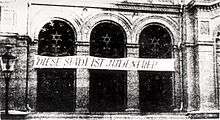Judenfrei

Judenfrei ("free of Jews") or Judenrein ("clean of Jews") was a Nazi term to designate an area "cleansed" of Jewish presence during The Holocaust.[1]
While Judenfrei referred merely to "freeing" an area of all of its Jewish inhabitants, the term Judenrein (literally "clean of Jews") was also used. This had the stronger connotation that any trace of Jewish blood had been removed as an impurity.[2]
Locations declared Judenfrei
Establishments, villages, cities, and regions were declared Judenfrei after they were ethnically cleansed of Jews.
- Gelnhausen, Germany – reported Judenfrei on November 1, 1938, by propaganda newspaper Kinzigwacht after its synagogue was closed and remaining local Jews forced to leave the town.[3]
- Erlangen, Germany was declared "judenfrei" in 1944.
- German-occupied Bydgoszcz (Poland) – reported Judenfrei in December 1939.
- German-occupied Luxembourg – reported Judenfrei by the press on October 17, 1941.[4]
- German-occupied Estonia – December 1941.[5] Reported as Judenfrei at the Wannsee Conference on January 20, 1942.[6]
- German-occupied Serbia/Belgrade – August 1942.[7][8][9][10]
- Vienna – reported Judenfrei by Alois Brunner on October 9, 1942.
- Berlin, Germany – May 19, 1943.[11]
Usage in Israeli–Palestinian conflict
In the Israeli-Palestinian conflict, a fear among many Israelis which has been reflected by Israeli government officials such as Benjamin Netanyahu[12] is that the proposed removal of Israeli Jewish settlements in the West Bank according to the wishes of Palestinian officials is tantamount to rendering these areas Judenrein, or clean of Jews.
On July 9, 2009, Benjamin Netanyahu, in a discussion with the German foreign minister Frank-Walter Steinmeier is reported to have said, using the Israeli terms of the area, "Judea and Samaria cannot be Judenrein."[13]
In 1952 Pesach Lev, first mayor of Lod after it was resettled by Israelis, said that Lod was transformed from 'a neglected Arab town that was Judenrein to a "Hebraic city."'[14]
References
- ↑ "Holocaust Glossary: Terms, Places, and Personalities". Jewish Virtual Library.
- ↑ "Aryanization: Judenrein & Judenfrei".
- ↑ "'Gelnhausen endlich judenfrei': Zur Geschichte der Juden während der Nationalsozialistischen Verfolgung" ['Gelnhausen finally free of Jews': On the History of the Jews during the Nazi persecution] (PDF) (in German). Archived from the original (PDF) on September 28, 2009.
- ↑ "Commémoration de la Shoah au Luxembourg" (in French). Government of Luxembourg. July 3, 2005. Archived from the original on September 30, 2007.
- ↑ "Extract from Report by Einsatzgruppe A". Archived from the original on November 12, 2007. Partial Translation of Document 2273-PS Source: Nazi Conspiracy and Aggression, Vol. IV. USGPO, Washington, 1946, pp. 944–949
- ↑ "Estonian Jews". Simon Wiesenthal Center. Archived from the original on September 28, 2007. sourced to Encyclopedia of the Holocaust. New York: Macmillan Publishing Company. 1990.
- ↑ Philip J. Cohen; David Riesman (1996). Serbia's Secret War: Propaganda and the Deceit of History. Texas A&M University Press. pp. 83–. ISBN 978-0-89096-760-7.
- ↑ Final Solution (New York, 1985), p. 77 ; Walter Manoschek (1993). "Serbien ist judenfrei". Munich: R. Oldenbourg. ISBN 3486559745.
- ↑ John K. Cox (2002). The History of Serbia. The Greenwood histories of the modern nations. Greenwood Publishing Group. p. 93. ISBN 9780313312908.
- ↑ Wolfgang Benz (1999). The Holocaust: A German Historian Examines the Genocide. Columbia University Press. p. 86. ISBN 9780231112154.
- ↑ "Was war am 19. Mai 1943" [What was on May 19, 1943] (in German). chroniknet.
- ↑ Dan Williams (July 9, 2009). "Judenrein! Israel adopts Nazi term to back settlers". Reuters.
- ↑ "German FM: Settlements Remain Obstacle to Peace; Frank-Walter Steinmeier says is encouraged by Israel's acceptance of a two-state solution". Haaretz. Reuters and DPA. July 9, 2009.
- ↑ Reference 102 in http://dictionnaire.sensagent.leparisien.fr/1948%20Palestinian%20exodus%20from%20Lydda%20and%20Ramla/en-en/
